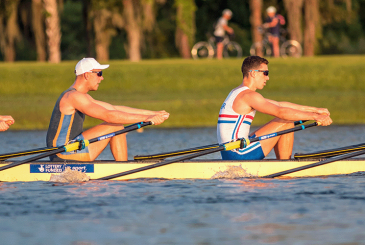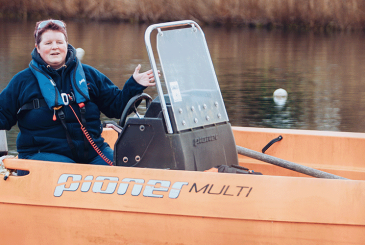Alan Oldham talks to coaches from Peterborough in the UK and Peterborough in Canada to see what they’ve learned from the pandemic
Winter training had been tough – it always was – but spring was coming and with it the chance to get back into boats, to travel to regattas, to race again. For rowers, this was what they had been training for; 2020 was the year it would all come together… then suddenly, with little warning, everything fell apart.
Despite sitting on opposite sides of the Atlantic, Peterborough City Rowing Club here in the UK and Peterborough Rowing Club in Ontario, Canada, both experienced the instabilities of indefinite restrictions aimed at slowing the global Coronavirus pandemic. Both also enjoyed a partial return to normalcy as lockdowns eased through the year, allowing rowers into boats even while racing remained a distant dream.
We spoke to coaches at these clubs with a shared name to learn how a group of Canadian masters and another of British juniors have found ways forward through the common experience of a pandemic year.
Attention! Red flag
“We were looking at getting back on the water,” said James Dyer, acting Head Coach at the mid-sized Canadian rowing club on the Otonabee River, a crucial link in the Trent-Severn Canal that tethers two of North America’s Great Lakes: Huron and Ontario.
“Typically, after winter where we stayed connected a few times a week, we would be shifting into a more intense every day programme, starting to prepare for regattas,” he said of the club’s 30 or so masters. “We had our communication all set saying ‘here is the schedule’. Then COVID hit.”
It was a similar story some 5,544 kilometres to the east where junior rowers in another Peterborough were eager to test their winter training on their own purpose-built rowing lake and the nearby River Nene.
“We were starting to organise into racing again,” said Tom Kisby, Lead Coach for Peterborough’s Junior programme. “We normally have 80 to 100 juniors across a few different groups: learn to row, top performance group and a larger group in the middle who are either progressing towards performance or a bit more recreational.”
“Lockdown started in March,” added fellow junior coach, Caroline Calver. “The Saturday before it was putting all the boats away and not knowing what was happening at that moment.”

As you were!
As rowing and almost all aspects of life moved online, virtual weeks ran into a reality of months before any semblance of on-water activities resumed.
“We already had an online training record with the performance group,” said Kisby, who found himself not only coordinating results but running regular sessions on the virtual platform Zoom. “We expanded that to include everybody. Not everyone has ergos, so we broadened out what training they could do.”
“When we started the Zoom sessions,” Calver said, “some groups were separate, but soon they were training all together.”
“Online sessions targeted mobility, core strength, the things where people usually think, I’d like to go for breakfast instead”
The online pivot and blurring of performance lines was not easy for everyone, but as Kisby pointed out, there were unexpected benefits. “I started recognising the same faces driven to attend all their sessions – not necessarily athletes I would have known before. I feel we’ve coached a broader range of athletes.
“It was an opportunity to come up with better systems for helping athletes through the junior stream. It has made a difference.”
“We didn’t know how long things would be online,” said Dyer, whose Canadian masters carved out online space to stay connected. “Our focus shifted from what we would do in the future, to what we could do right then.
“Online sessions targeted mobility, core strength, the things where people usually think, I’d like to go for breakfast instead. When we started as a group online people did it. That new aspect of our winter programme isn’t going away.”
Go!… sort of
Easing lockdowns through the summer meant a return to on-water rowing, but it was far from business as usual.
“Being back at the club was hard at first,” said Kisby. “The limits were pretty strict, so we were only in singles. Matching up athletes to boats and times and ability was difficult.”
Far from increasing isolation, he said that being in singles brought everyone together
Despite hurdles to getting on the water, the rowers’ joy was palpable, recalled Calver. “There was such a positive attitude. The kids just seemed so happy to see each other. Some couldn’t wait to be in bigger boats, but for many, being in singles gave them their confidence back. There was a spirit of being a team.”
No surprises was another benefit of strict planning at both Peterborough clubs.
“We implemented a weekly sign-up for COVID tracking,” said Dryer. “It turned into a general scheduling tool, so we knew exactly who was where when.”

Far from increasing isolation, he said that being in singles brought everyone together. “Any time there is a shared human experience, those social bonds grow stronger; COVID was one heck of an experience.”
2020 vision
“One of the most valuable lessons of the pandemic,” reflected Dyer, “is that competition is not the only reason we row – or even the most important. Motivations like being social, fit, lowering stress, working on ourselves: these are things we can hold onto to make us stronger in the future.

“We’ve found ways to create joy in training and productivity in completely new ways. Training is only going to get better.”
With the traditional tally of medals impossible to fill in 2020, the Peterborough juniors on this side of the pond similarly broadened their definition of success. It is something Calver and Kisby hope stays with them as racing returns.
“There is a nicer, friendlier atmosphere,” concluded Calver, “Coaches are working together to do what’s best for the athletes, seeing potential, not limiting them. Even though the kids were on the water less, their coaching was better and skills improved faster.”
“The smallest slice of water time we could give them was precious,” added Kisby. “The kids will benefit from the skills we developed during the pandemic and have a willingness to get on and enjoy the sport for what it is.
“They’ll live life differently – I think we all will.”











